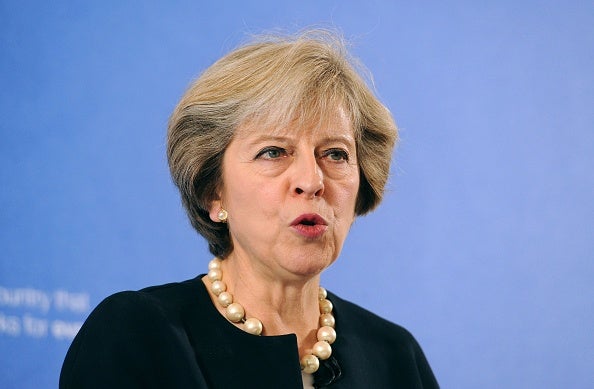Theresa May has said private schools are 'divorced from normal life' as she makes a pitch for the working class vote
She is to demand they provide more places for children from low income familes and sponsor state schools

Theresa May has launched a scathing attack on big private schools by claiming they are “divorced from normal life”, as she set out sweeping education reforms.
The Prime Minister said she will make them justify the huge tax breaks they receive by setting up and running state schools and ensuring their success.
Her words were part of an audacious bid to grab the political centre-ground, presenting herself as a social reformer who will act on behalf of the working class.
She also developed her plans to massively expand the number of selective grammar schools, by saying children who do not pass an 11-plus exam will still be able to move into them later in their education if they perform well.
Only this morning chief inspector of schools Sir Michael Wilshaw warned that bringing back grammars would be “going backwards” and mean the de-facto return of the much-hated secondary moderns.
Mrs May had already revealed she planned to roll new grammar schools out across the country, sparking a backlash from education charities and unions.
But her speech today revealed the move is a key part of a much wider agenda for her administration.
Elitist Britain: Run by the privately educated
Show all 7It was a direct pitch to exactly the kind of voters the Tory party needs to win elections, lower middle class people who cannot afford private schools and working class people who do not qualify for state support – those who ex-Labour Leader Ed Miliband once called the “squeezed middle”.
Mrs May’s speech was laced with language about creating a “great meritocracy” and helping those “just getting by”.
It even mirrored some Ukip rhetoric, attacking a distant and irresponsible elite behind the 2008 crash, that has gained the anti-EU party ground in Labour’s northern heartlands.
In a key moment, aimed at showing she is not afraid of taking on the establishment, Mrs May said: “Most of the major public schools started out as the route by which poor boys could reach the professions.
“The nature of their intake may have changed today – indeed these schools have become more and more divorced from normal life.
“Between 2010 and 2015 their fees rose four times faster than average earnings growth, while the percentage of their pupils who come from overseas has gone up by 33% since 2008.”
The attack, which Eton-educated David Cameron could not have credibly made, was followed by a pledge that big private schools will have to sponsor or set up a new government-funded school “in the state sector, and take responsibility for running it and ensuring its success.”
They may also have to fund places within their own schools for children who cannot afford the fees.
Announcing her plan to expand the number of grammars, she then sought to address concerns over selection at age 11.
She said: “We will demand that new grammars make the most of their freedom to be flexible over how students move between schools, encouraging this to happen at different ages such as 14 and 16 as well as 11.”
The Prime Minister will hope that the focus on help for working class pupils will also help her pass the reforms through Parliament, where she faces a minority in the House of Lords. Both Labour and Liberal Democrat politicians have signalled their opposition to her policy.
Mrs May also confirmed proposals to redraw rules restricting the proportion of children that faith schools take from their chosen religion to 50%.
She argued that existing regulation only really impacted on largely over-subscribed and successful Catholic schools.
The Prime Minister said: “This is especially frustrating because existing Catholic schools are more ethnically diverse than other faith schools, more likely to be located in deprived communities…and there is growing demand for them.”
School inspector Sir Michael, who is about to retire, told BBC radio that selection would be “going backwards” and putting 20 years of progress in education policy at risk.
He said: “We will fail as a nation if we only get the top 15% to 20% of our children achieving well.
“We've got to, if we're going to compete with the best in the world, get many more children to achieve well in our schools.
“My fear is that by dividing children at 11 and by creating grammars and secondary moderns - because that's what we'll do - that we won't be able to achieve that ambition.”
Following Mrs May’s speech, Sir Peter Lampl, chairman of the Sutton Trust and Education Endowment Foundation, said: “Sutton Trust research has shown the existing grammar schools to be highly socially selective, mainly because of private tuition and prep schools for those who can afford them.
“The government should ensure that existing grammar schools get it right before opening more grammar schools.”
Subscribe to Independent Premium to bookmark this article
Want to bookmark your favourite articles and stories to read or reference later? Start your Independent Premium subscription today.

Join our commenting forum
Join thought-provoking conversations, follow other Independent readers and see their replies